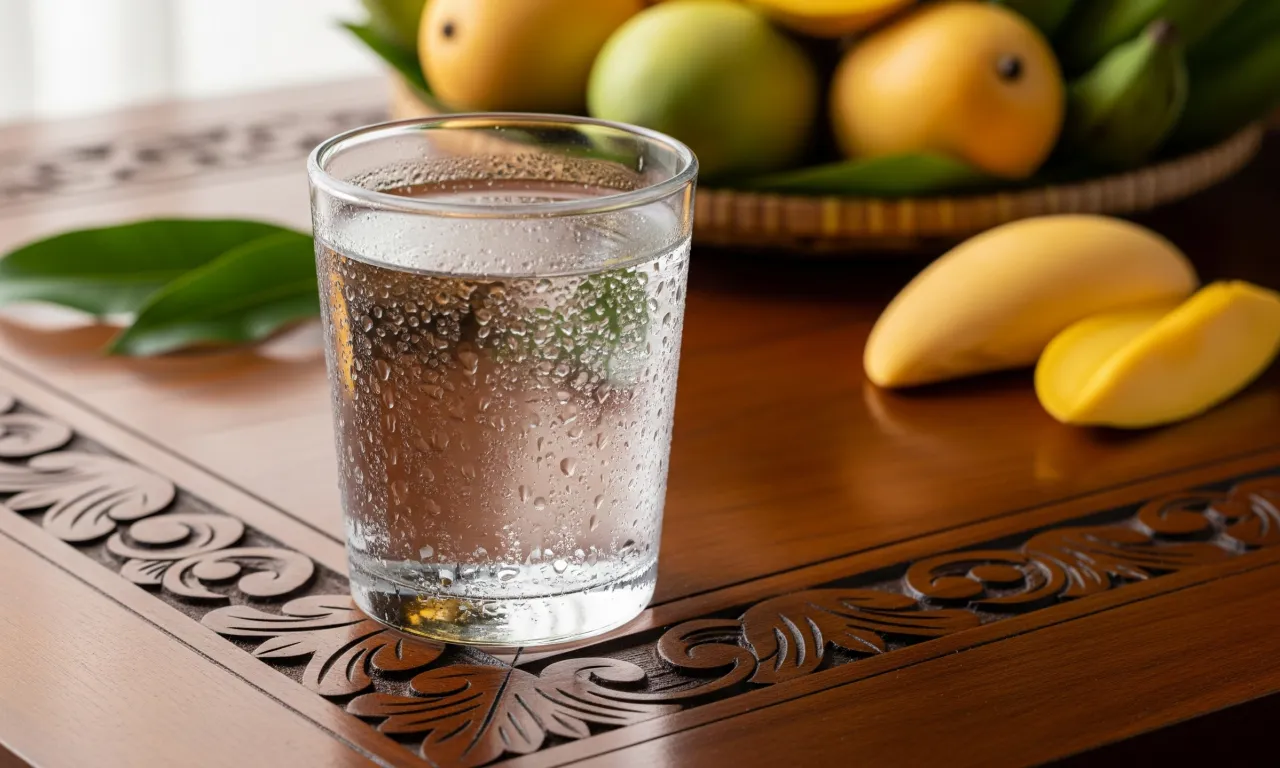If you’ve ever walked through a grocery aisle or scrolled TikTok wellness tips, you’ve probably seen it – alkaline water bottles proudly labeled “pH 9+,” promising everything from better digestion to glowing skin. Parang magic potion, ‘di ba? But with so many health fads today, is it really worth the hype or just another marketing gimmick?
- 💧 What Exactly Is Alkaline Water?
- 🧠 Claimed Benefits: What Science Actually Says
- ⚠️ Possible Side Effects (Yes, There Are Some)
- 🏷️ Best Alkaline Water Brands in the Philippines
- ⚙️ Machines & Refilling Stations: Is It Worth Buying?
- 💬 Alkaline Water vs. Mineral and Purified Water
- 🧾 Quick Takeaways for Everyday Pinoys
- 🙋♀️ FAQ: Everything Pinoys Ask About Alkaline Water
- 💭 Final Hirit: Don’t Chase Hype, Chase Balance
- 🧭 References
In the Philippines, more and more people are switching from regular mineral or purified water to alkaline water, believing it helps neutralize acidity, improve energy, and even slow down aging. From big brands like Nature’s Spring and Summit to refill stations offering “alkaline refills,” this trend isn’t slowing down anytime soon.
So the big question remains: Does it really make you healthier – or is it just expensive tubig with fancy labels? Let’s break it down, kabayan-style.
💧 What Exactly Is Alkaline Water?
Before you spend extra pesos on that “miracle” bottle, let’s start with the basics – what really makes alkaline water different from the tubig you already drink every day?
In science terms, alkaline means having a higher pH level – meaning, it’s less acidic. Regular drinking water usually has a pH of 7, which is neutral. But alkaline water? It’s between 8 and 9.5, depending on the brand or source. The idea is that this higher pH can help “neutralize” acid in your body. Sounds healthy enough, right?
🧪 How It’s Made
There are two main ways alkaline water is produced:
- Natural Alkalinity – This happens when water flows through rocks and soil, picking up minerals like calcium, magnesium, and potassium. Think of spring water coming straight from the mountains – organic na organic.
- Ionized or Processed Alkalinity – This is what most bottled or refilled alkaline waters in the Philippines are. They use a machine called a water ionizer that separates acidic and alkaline components through electrolysis.
Basically, it’s a science experiment turned into business. 😅
| Type of Water | Typical pH Level | How It’s Made | Common Source in PH |
|---|---|---|---|
| Purified Water | 7.0 | Filtered & treated | Refill stations, bottled |
| Mineral Water | 7.5–8.0 | Natural from springs | Local & imported brands |
| Alkaline Water | 8.0–9.5 | Ionized or treated | Bottled brands, refill |
| Distilled Water | 7.0 | Steam-processed | Home/office dispensers |
Now here’s something most people don’t know – not all alkaline waters are created equal. Some are genuinely rich in minerals, while others are just regular purified water passed through an ionizer. So if you’re refilling from a neighborhood station, it’s always smart to ask for their pH test certificate or test it yourself with strips (available online or sa Shopee).
In short: alkaline water isn’t a new discovery – it’s just regular water that’s been tweaked to be a little less acidic. Whether that tweak is actually helpful? That’s where it gets interesting…
🧠 Claimed Benefits: What Science Actually Says
Here’s where the debate gets heated – literally every alkaline water ad sounds like it can fix everything from acid reflux to aging. Pero totoo ba talaga? Let’s unpack each claim and see what the science says versus what’s just marketing.
🩺 1. It “Balances” Body Acidity
You’ll often hear that alkaline water neutralizes acid in your system. In theory, yes – because of its higher pH. But in reality? Your body already does this job really well on its own. Your stomach acid sits at around pH 1.5 to 3.5 – super acidic – and it’s designed to stay that way to help digest food and kill bacteria.
Drinking a few glasses of alkaline water won’t drastically change your internal pH. At best, it can help temporarily relieve mild acidity or acid reflux for some people, which is why many Pinoys swear it helps after eating spicy sisig or drinking coffee. But if you have frequent heartburn, see a doctor – don’t just rely on fancy tubig.
⚡ 2. Better Hydration, Daw
Some studies suggest that alkaline water may hydrate faster than regular water after workouts because it contains smaller “molecular clusters” that are absorbed more easily. Sounds high-tech, right? But truth is, the science behind that is still limited.
What’s more likely is this: people who switch to alkaline water usually end up drinking more water because they like its smoother taste. That alone improves hydration – so the benefit might come from habit, not chemistry.
Still, athletes and fitness buffs in PH (lalo na those in humid cities like Cebu or Davao) say alkaline water helps them recover faster. If that’s your vibe, go for it – just don’t expect superhuman stamina overnight.
🌿 3. Detox and Energy Boost
You’ve probably seen posts claiming that alkaline water can flush out toxins or boost your energy. Medyo exaggeration ‘yan. 😅 Our liver and kidneys are already pros at detoxing the body. Alkaline water doesn’t replace that, but it can support the process by keeping you hydrated – which helps your organs function well.
As for “more energy,” hydration in general keeps you alert. So again, maybe it’s not the alkalinity doing the magic – it’s the fact na you’re finally drinking enough water.
🧬 4. Anti-Aging and Immunity Benefits
This one’s a crowd favorite – “alkaline water fights free radicals” daw. There are a few small studies suggesting ionized water may have antioxidant effects, but evidence is still early. You’ll get far more antioxidants from fruits, veggies, and a good night’s sleep.
If you want youthful skin and stronger immunity, alkaline water can be one part of a healthy lifestyle – not the whole solution. Parang teamwork lang: it helps, but it can’t carry the whole game.
🧘 The Bottom Line
So here’s the real deal: alkaline water isn’t useless, but it’s also not a miracle drink. Think of it like leveling up your hydration, not curing all your problems. If it makes you feel lighter, less bloated, or simply motivates you to drink more – then sulit na.
But if you’re expecting it to reverse diseases or make you “forever young”? Sorry, Friend, that’s not how biology works.
⚠️ Possible Side Effects (Yes, There Are Some)
Here’s the part most people skip – because let’s face it, marketing rarely talks about downsides. But like anything health-related, too much of a good thing can backfire. Yes, even water.
Alkaline water is generally safe for most healthy people, pero kung sobra or not suited for your body, it can cause a few minor issues.
🧍♂️ 1. It Might Mess With Your Digestion
Your stomach needs strong acid to digest food properly. If you drink too much high-pH water, you might neutralize that stomach acid – which can lead to bloating, indigestion, or nausea. Some people even report feeling “too full” or heavy after switching completely to alkaline.
Tipid tip lang: alternate between alkaline and regular purified water during the day. Your body doesn’t need everything alkalized 24/7.
🧂 2. Too Many Minerals for Sensitive Kidneys
Most alkaline waters (especially ionized ones) contain added minerals like calcium, potassium, and magnesium – all good in moderation. Pero if you already have kidney issues, your body might struggle to filter excess minerals efficiently. Doctors actually recommend that people with chronic kidney disease avoid mineral-heavy water.
So kung may medical condition ka or maintenance meds, best to ask your doctor first before going full-on alkaline.
⚖️ 3. Alkalosis: When “Too Alkaline” Is a Problem
It’s rare, but possible – overdoing alkaline water can make your blood too basic, a condition called metabolic alkalosis. Symptoms include tingling, muscle twitching, confusion, or vomiting. Usually, this happens only when people drink large amounts daily (like 4–5 liters) plus alkaline supplements.
So, moderation pa rin. Drink when you’re thirsty. Don’t treat it like a magic potion you need every hour.
🧘♀️ 4. May Not Be Ideal for Everyone
Babies, toddlers, and seniors may have more sensitive digestive systems. For kids, regular purified or mineral water is perfectly fine. For seniors, especially those with existing health conditions, switching to alkaline water should always be gradual.
In short: alkaline water is harmless for most people – but listen to your body. If you start feeling weird, go back to regular water and observe. Sometimes, the simplest things (like hydration and balanced meals) already give you all the benefits you’re chasing.
🏷️ Best Alkaline Water Brands in the Philippines
Now that we’ve covered the pros and cons, let’s talk about what really matters when you’re standing in front of the grocery shelf – which alkaline water is worth your money? In the Philippines, the market’s booming. You’ll find everything from ₱20 bottles in 7-Eleven to ₱300 imported liters promising “Japanese purity.” Pero which ones actually deliver?
Here’s a quick rundown of some trusted alkaline water brands easily available nationwide – from convenience stores to refill stations.
| Brand | Approx. pH Level | Where to Buy / Notes |
|---|---|---|
| Nature’s Spring Alkaline Water | 8.2 – 9.0 | Widely available; smooth taste; great for daily use |
| Summit Natural Alkaline Water | 8.6 | Slight mineral taste; great for workouts or hot weather |
| Wilkins Pure Alkaline | 8.0 – 8.8 | Consistent quality; available in SM, Mercury, groceries |
| BlueWater Alkaline | 9.0 | Common in refill stations; check for updated pH tests |
| Aquahealth Alkaline Ionized Water | 8.5 – 9.5 | Offers both refilling and home delivery services |
| Sapporo Alkaline (Japan) | 9.5 | Imported option; pricey but premium taste |
| Crystal Clear Alkaline | 8.8 | Popular in refill stations; trusted by households |
🧃 What Filipinos Say
Most people who switch to alkaline water mention two things: it tastes smoother and feels “lighter” on the stomach. Some even claim they drink more water because it doesn’t leave that “heavy” feeling. Others just like the idea that it’s “healthier,” kahit konting placebo effect lang.
💡 Local Hack: Test Before You Commit
Before buying gallons or signing up for delivery, test the brand’s pH level yourself. You can buy affordable pH test strips (₱100–₱150 on Shopee or Lazada). Dip one into the water – if it turns blue to dark blue, that’s truly alkaline (around 8–9 pH). Anything closer to green? Neutral lang ‘yan, friend.
If you’re getting water from a refilling station, politely ask for their latest DOH permit or water test result. Some stores label their water as “alkaline” without actually ionizing it. Naku, marketing lang pala.
🛒 Price and Availability
Here’s a quick price guide so you don’t overpay:
| Container Size | Price Range | Where Commonly Sold |
|---|---|---|
| 350–500 ml bottle | ₱20–₱30 | Convenience stores |
| 1-liter bottle | ₱35–₱60 | Groceries, supermarkets |
| 5-gallon refill | ₱60–₱120 | Refilling stations, delivery |
| Ionized home refill plan | ₱200–₱400 / week | Alkaline delivery services |
So, is it worth it? If you’re curious, try a few brands and compare how you feel for a week or two. Some people instantly love it, some don’t notice much difference. And that’s okay – our bodies aren’t one-size-fits-all.
⚙️ Machines & Refilling Stations: Is It Worth Buying?
Now here’s where things get serious – and a bit pricey. Once people start liking alkaline water, many begin to wonder: “Should I buy my own ionizer?” or “Mas makakatipid ba ako kung magpa-refill na lang?”
Let’s break it down para hindi sayang ang pera.
🏠 Home Ionizer Machines
These are electric devices that turn regular tap or purified water into alkaline water through a process called electrolysis. It separates water into two streams – one acidic, one alkaline. You simply collect the alkaline side for drinking. Sounds fancy, and to be fair, it is.
But they don’t come cheap. Depending on the brand and features, here’s what you’re looking at:
| Machine Type | Price Range | Description / Notes |
|---|---|---|
| Basic Countertop Ionizers | ₱15,000 – ₱30,000 | Simple plug-in models; good for small households |
| Multi-Plate Ionizers | ₱40,000 – ₱80,000 | More stable pH output; better for frequent users |
| Premium Japan/Korea Units | ₱100,000+ | Medical-grade; used in clinics and wellness centers |
Some Pinoy households invest in these because they want control and convenience. Once installed, you just push a button and get fresh alkaline water anytime. The long-term savings start showing after a year or two – kung consistent ka uminom, that is.
💧 Refilling Stations (Alkaline Refill Water)
If a home machine feels too expensive, no problem – that’s why refilling stations exist. All over the Philippines, you’ll find shops labeled “Alkaline Ionized Water” or “Alkaline Refill Express.” They usually sell 5-gallon containers for ₱60–₱120 depending on the area.
The good thing? You don’t need to invest upfront. Just bring your jug, refill weekly, and enjoy the same hydration benefits without the maintenance or electric bill.
But – and this is important – quality can vary. Some stations don’t regularly calibrate their ionizers or renew their DOH water safety permits. So again, check their latest pH certificate and make sure their machines are still operational.
🔍 Which Option Is Better?
If you drink a lot of water and want guaranteed purity, a home ionizer might be worth it. But if you’re still testing whether alkaline water truly works for your body, stick to refills first.
Quick tip:
- Households with 3–4 people usually spend around ₱1,000–₱1,500/month on refills.
- That’s still cheaper than investing ₱50k+ upfront, unless you’re 100% committed.
In short, both options work – it depends on your lifestyle and budget. The important thing is not the machine or the label on the bottle, but the consistency of drinking clean, safe water everyday.
💬 Alkaline Water vs. Mineral and Purified Water
Let’s be real – not everyone needs alkaline water. For most Pinoys, purified or mineral water already does the job. Pero since the question keeps popping up – “What’s the difference nga ba?” – here’s an honest side-by-side look so you can decide what fits your lifestyle and budget.
| Aspect | Alkaline Water | Mineral Water | Purified Water |
|---|---|---|---|
| pH Level | 8.0 – 9.5 | 7.5 – 8.0 | 7.0 (neutral) |
| Main Source | Ionized or treated | Natural springs | Filtered tap or well water |
| Mineral Content | Added or natural minerals | Naturally occurring minerals | Minimal or none |
| Taste | Smooth, slightly sweet or “soft” | Crisp, mineral flavor | Neutral, plain |
| Cost per Liter | ₱25 – ₱60 | ₱15 – ₱40 | ₱10 – ₱25 |
| Health Benefit | May help mild acidity | Natural electrolytes | Pure hydration |
| Best For | Acidic stomachs, gym-goers | Daily hydration | Babies, cooking, sensitive stomachs |
🧊 Taste and Texture
Some say alkaline water tastes “silkier” or “lighter” – medyo subjective ‘yan. Mineral water tends to have that crisp flavor because of its natural calcium and magnesium. Meanwhile, purified water? Very neutral. Great for mixing coffee or cooking rice since it won’t alter taste.
💸 Cost and Convenience
If you’re drinking mainly at home, purified water refills are the most practical – mura, widely available, and easy to deliver. Alkaline water can double the cost, especially if you’re buying bottled versions. Mineral water sits right in the middle – affordable but still packed with natural minerals.
🩺 Health and Hydration
The biggest misconception is that alkaline water is automatically “healthier.” In truth, all three hydrate you the same way. The edge of alkaline water lies in taste preference and personal response. If it makes you drink more water, then that’s already a win.
So, what’s the verdict?
- On a budget? Go purified.
- Want minerals? Choose mineral.
- Feeling acidic or like experimenting? Try alkaline.
The best water is still the one that keeps you drinking enough daily – period.
🧾 Quick Takeaways for Everyday Pinoys
Alright, let’s keep it simple, mga Mam/Sir. After all the science, marketing, and chismis, here’s what you really need to remember about alkaline water:
✅ Safe for most people – Walang masama, as long as you don’t overdo it.
✅ May mild benefits – Can help with slight acidity or digestion for some people.
✅ Not a cure-all – It won’t detox, heal, or “reverse aging” (sorry, bes).
✅ Quality varies – Always check for pH certification, especially sa refill stations.
✅ Moderation is key – Mix it up with regular water; your stomach still needs acid for digestion.
✅ Hydration pa rin ang bida – Whether alkaline, mineral, or purified, what matters is you drink enough water daily.
Think of alkaline water as a small upgrade, not a life-changing miracle. If it fits your body and budget, go for it. But if you’re happy with your current setup and feel fine? No need to complicate things. Sometimes, simplicity is the healthiest choice.
🙋♀️ FAQ: Everything Pinoys Ask About Alkaline Water
1. What is the ideal pH level for drinking water?
The best pH level for drinking water is between 7.5 and 9, depending on your body’s needs. Anything too high (above 10) can taste bitter or cause digestion issues. In the Philippines, most trusted alkaline water brands stay safely within the 8–9 range – enough to balance mild acidity without affecting stomach health.
2. Can kids drink alkaline water every day?
Yes, but only in moderation. Children’s bodies naturally regulate acidity better than adults, so they don’t really need high-pH water daily. Giving them alkaline water occasionally is fine, but purified or mineral water remains the safest option for everyday hydration.
3. Is alkaline water safe for pregnant women?
Generally yes, as long as it comes from a DOH-certified source. Alkaline water may help reduce acid reflux during pregnancy, but overconsumption could affect digestion. Pregnant women should alternate between regular purified and alkaline water to stay balanced.
4. Does alkaline water really help with acid reflux?
Some studies show alkaline water can temporarily neutralize stomach acid and ease mild reflux. It works best when combined with a healthy diet and smaller meals. But for chronic heartburn, consult a gastro doctor – don’t rely solely on alkaline water.
5. Can I use alkaline water for cooking rice or coffee?
Yes! Many Filipinos use alkaline water to cook rice or brew coffee because it enhances flavor and texture. It may make rice softer and reduce bitterness in coffee, but the difference is subtle. Just make sure the water’s pH stays between 8 and 9.
6. What’s the difference between alkaline and ionized water?
They’re often the same thing – “ionized water” simply refers to how alkaline water is made using an electrolysis process. Some brands use natural minerals instead of machines, but both aim for the same result: higher pH and smoother taste.
7. Can alkaline water help with weight loss?
Not directly, but it can support your weight goals by replacing sugary drinks. Staying hydrated improves metabolism and energy levels, which can encourage better eating habits. But remember – it’s your overall diet and activity that make the biggest difference.
8. Does alkaline water expire?
Yes, bottled alkaline water typically maintains its pH for 6–9 months when sealed and stored properly. Refilled alkaline water loses its alkalinity faster, usually within 3–4 days after opening. Always keep it away from heat or sunlight to preserve its quality.
9. Can alkaline water cause any side effects?
Overdrinking can sometimes cause stomach discomfort or alkalosis, especially if you already have kidney problems. It’s best to start with 1–2 glasses a day, then observe how your body reacts. Most people tolerate it well as part of a balanced hydration routine.
10. How do I know if my alkaline water is legit?
Use pH test strips or a digital tester – available in hardware or online stores – to verify its alkalinity. True alkaline water will show a blue to deep blue color (around 8–9 pH). Also, check if your refill station has updated DOH permits and recent water test results.
💭 Final Hirit: Don’t Chase Hype, Chase Balance
At the end of the day, tubig is tubig – it sustains life, keeps us going, and quietly does its job without asking for attention. Alkaline, mineral, purified – they all share the same mission: to keep you hydrated and healthy. So before you spend thousands chasing what’s “in,” pause for a bit and ask yourself… am I simply drinking enough water every day?
If alkaline water makes you feel good and fits your lifestyle, go ahead. But remember, real wellness doesn’t come from what’s bottled – it comes from habits you build daily. Sleeping enough. Eating real food. Laughing with family. Taking deep breaths when life gets too acidic (pun intended 😅).
So, drink your water – whatever kind it is – and keep your body in balance. Because sometimes, the healthiest thing isn’t the most expensive one. It’s the one that reminds you to slow down, take a sip, and just… breathe.
🧭 References
-
Healthline – Alkaline Water: Benefits, Side Effects, and Common Questions
-
Mayo Clinic – Alkaline Water: Better than plain water?
-
Verywell Health – Alkaline Water: Benefits and Possible Risks
-
ATROS – 10 Powerful Health Benefits of Drinking pH Alkaline Water
-
MyBest Philippines – 10 Best Bottled Water in the Philippines 2025
-
PMC NCBI – Associations of alkaline water with metabolic risks and sleep quality










